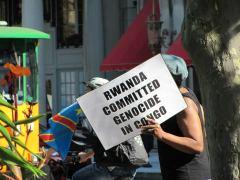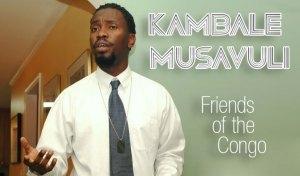
There is no doubt about that. The Mapping Report attests of that reality. That US and other interested parties ignore that fact does not change it.
The following note is from Kambale Musavuli, spokesperson of Friends of the Congo. Is he surprised that US continue to protect Rwanda and Uganda? I don’t think so. I find that through his message, he would like Congolese to find the solution themselves to the far too long crisis that DRC has been experiencing for almost two decades. They should stop thinking that any external intervention will help.

Kambale Musavuli, Spokesperson of the Friends of the Congo
It’s important for the Congolese youth to study US response to the crisis in the Congo. I have argued that the US is doing so many things except what needs to be done. If you re-read Ambassador’s Carson statement at Brookings, you can see how the US is choosing to be engaged.
First and foremost, the DRC Government and its people have primary responsibility for rising to the challenges that they face. But the international community should be complementing these efforts with a more focused and holistic approach.
“I believe this approach requires four basic components, all of which are interdependent and all of which are equally important.”
First, the D.R.C., Rwanda, Uganda, and other countries in the region must sign and implement the United Nations framework agreement as soon as possible. The United States supports the principles in the agreement and the ongoing efforts by the United Nations to secure signatures.
Second, we need to put flesh on the bones of the agreement by establishing a comprehensive peace process around the agreement’s principles. This process needs to include all of the relevant parties – not just the countries in the immediate region, but also local communities in the Kivus, civil society, and a clearly defined role for the international community.
Third, the United Nations must complete its reevaluation of the role and strength of MONUSCO and implement necessary changes to the mission’s structure as soon as possible.
Fourth, and finally, if we are to adopt a holistic approach, the D.R.C. Government must build on the incremental reform progress it has made by implementing long-overdue reforms and demonstrating much greater political will and inclusivity. And if we are serious, international assistance should be conditioned on the D.R.C. Government making further reform progress.”
http://www.state.gov/p/af/rls/rm/2013/204511.htm
Summary: The US govt believes that a UN agreement which will include civil society and other stakeholders, a reform of MONUSCO mandate, political reforms in Kinshasa are ways the international community should be engaged.
Question that should be asked… why is the US pushing for everything that will not stop Rwanda and Uganda to continue supporting rebels in the Congo?
Am I the only one studying what the US is doing re: Congo crisis?
By asking why the US is not taking the appropriate decisions which could end DRC crisis, the author of the note is ignoring one critical element. What is good for Congo does not necessary have to be for the American government. Barack Obama, back in August 2010, clarified that point in a public gathering at the White House. He was receiving Young African Leaders. At a question from one participant who was asking what would be the US position if African interests were found to be incompatible with those of his fellow citizens, the US president stressed that he was elected in office to defend his nation’s interests, nothing less nothing more. This view lends to putting any change needed in DRC in the hands of Congolese, and nobody else.
